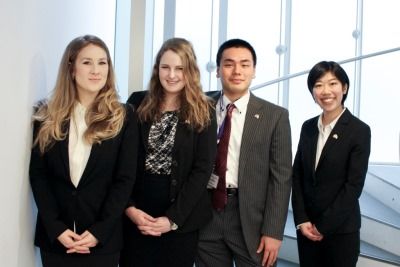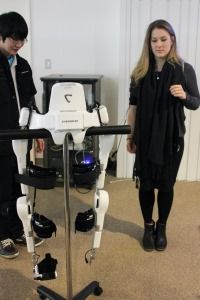

Meagan Berlin, Law ’16, was one of 14 Canadian university students chosen to attend this year’s Japan-Canada Academic Consortium (JACAC) Student Forum. An equal number of Japanese students similarly selected from a variety of academic backgrounds gathered with the Canadians at Meiji University in Tokyo February 14-23 to exchange ideas on a topic of mutual interest: “Toward a Sustainable Economic and Social Development: Challenges in Aging Society in Canada and Japan.”
“Meagan applied to be a delegate because of the way the JACAC forums are designed to encourage academic collaboration and teamwork among students from different cultures and disciplines, giving them deeper insights into their current areas of special interest. JACAC’s longer-term goal is to inspire a flow of ideas between the two countries’ future decision-makers. Although Japan hadn’t figured in her research previously, Meagan says she entered the competition to take advantage of what she knew would be an academic challenge. The trip itself and experiencing a new culture also seemed like great opportunities. Her persuasive application essay won her Queen’s endorsement. ”
During their week in Japan, delegates attended presentations and participated in discussions and field trips. For Meagan, one of the most notable lectures was “Opportunities in the Aging Society,” delivered by Japan’s former Ambassador to Canada. He made clear how the two countries’ vastly different immigration policies impact the challenges they face from aging populations.
“The most important thing I learned from his talk,” Meagan says, “is to approach issues and problems through the lenses of those whom they will impact. Some ideas suggested by both the Canadian and Japanese students for implementation in the opposite country were simply not appropriate because of cultural and societal differences.”
Meagan’s contribution of her legal knowledge to her group’s final presentation was well received, however. “We integrated the idea of pro bono law services for elder care into our overall theme of loneliness in the elderly population and their restricted access to health care and legal aid.”
Among the students’ field trips was one to the Cyberdyne Studio to see, firsthand, Japanese robot technology and its potential application to the lives of aging people. Meagan found herself incredibly impressed that Cyberdyne’s goal is not to create a stand-alone robotic figure, but to integrate robotics with direction from humans – “for instance,” she says, “enabling and supporting people in sustaining their daily activities, giving them the strength to lift objects or to walk.”
Although Cyberdyne was fascinating, Meagan’s favourite memory of Japan is the closing ceremony and networking event held at the Canadian Embassy in Tokyo, where Princess Takamado shared with the students some special tips for public speaking.
What else did she take away from Japan? First, Meagan lists her increased confidence in making public presentations. “It was incredibly interesting,” she adds, “to work in a group with Japanese students from different academic backgrounds, such as medicine and social work. I loved that our collaboration often incorporated everybody’s perspectives and backgrounds and produced the kind of innovative results that none of us would have come up with working alone or in all-Canadian or all-Japanese groupings.”
JACAC mission accomplished.